|
|
|
Sort Order |
|
|
|
Items / Page
|
|
|
|
|
|
|
| Srl | Item |
| 1 |
ID:
110780
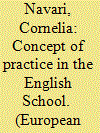

|
|
|
|
|
| Publication |
2011.
|
| Summary/Abstract |
The English School concept of practice is what Stephen Turner in The Social Theory of Practices calls a 'telic' notion. A telic practice is an activity seeking a goal 'which is conceived as a result of following certain general principles of procedure'. Examples of telic practices are playing a game of chess, holding a seminar, baptizing a baby or going fly-fishing. Such practices are carried out according to standards of excellence set forth in some tradition of interpretation. Maurice Keens-Soper has placed de Caillèires' De la maniere de negocier avec les souverains in a tradition of interpretation applied to diplomacy, and one that set standards. A practice in the English School sense is not a private idea: a commitment to communal standards is required if one is to talk meaningfully of a practice. A telic notion of practice may be contrasted with a causal notion. In the causal notion, a practice is a form of mentalist 'object' which impinges on behaviour. Pierre Bourdieu (1977), for example, is interested in practices as hidden convictions or habits shared by a group; his 'habitus' informs social action. Either as a kind of presupposition, or as a kind of mental trace, a practice in the causal sense disposes thought or action in a certain way. In this form, practices are not directly accessible, their existence must be inferred, and the means of accessing them are fraught with difficulties. A person engaging in a telic practice is guided by its standards rather than being caused to perform, and telic practices are directly accessible to empirical investigation.
|
|
|
|
|
|
|
|
|
|
|
|
|
|
|
|
| 2 |
ID:
110781
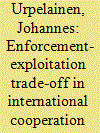

|
|
|
|
|
| Publication |
2011.
|
| Summary/Abstract |
According to the imperative of enforcement, states must threaten defectors with sanctions or reciprocal suspension of international cooperation. I show that in international cooperation between the weak and the powerful, states should nevertheless limit the supply of collective enforcement power. Strong sanctions allow exploitative international agreements, so weak states refuse to engage in negotiations with powerful states in the first place. For powerful states, toothless international agreements are a credible commitment to limit power politics. The result holds even if sanctions can be used only to enforce international agreements and not for coercion. It implies that under power asymmetry, states must accept constraints on the use of power, as opposed to simply maximizing the supply of collective enforcement power. The theory offers a new perspective to international cooperation and a synthesis of the enforcement and managerial schools of international cooperation. It produces precise analytical boundary conditions and generates falsifiable empirical hypotheses.
|
|
|
|
|
|
|
|
|
|
|
|
|
|
|
|
| 3 |
ID:
110779
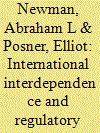

|
|
|
|
|
| Publication |
2011.
|
| Summary/Abstract |
This article revisits a fundamental question of international political economy: when does cross-border economic interdependence become a source of power. The view that economic interdependence is a source of potential power, not just mutual benefits, has a long lineage traceable to political realism, organizational economics, Ricardian trade theory, and structural Marxism, and researchers typically focus on preferred causal variables in isolation. Despite important contributions, little attention has been paid to understanding the interactions of multiple perspectives on asymmetric interdependence, or to making sense of contradictory expectations of the various models. As a consequence scholars engaged in globalization debates, such as those about policy convergence or private actor governance, frequently talk past one another. To deduce expectations about the relationship between power and interdependence, we build a model synthesizing standard approaches that analyze the effects of market size and market scope separately, and then add the critical variable of jurisdictional boundaries. By decoupling geography and authority, our analysis produces a respecification of classic interdependence models and advances core international political economy debates concerning power dynamics in a globalized economy.
|
|
|
|
|
|
|
|
|
|
|
|
|
|
|
|
| 4 |
ID:
110786


|
|
|
|
|
| Publication |
2011.
|
| Summary/Abstract |
Intellectual property rights (IPRs) ultimately delineate the way in which knowledge is created, owned, controlled and diffused, domestically and now globally. They have always been contested because knowledge is both a form of capital and a public good, but these contests have become more acute since the WTO TRIPs Agreement came into force in 1995. As a result of new frames and linkages propelled by various actors between IPRs and other issue-areas, the current intellectual property regime has become complex and somewhat inconsistent. This article contributes to a better understanding of the concrete mechanisms and processes through which various global regimes come to overlap with each other in the area of IPRs, of the actors that are involved in these processes, as well as of the consequences of such developments for the governance of IPRs and global governance more generally.
|
|
|
|
|
|
|
|
|
|
|
|
|
|
|
|
| 5 |
ID:
110782
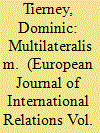

|
|
|
|
|
| Publication |
2011.
|
| Summary/Abstract |
When the United States faces loss or defeat in war, it is often loath to negotiate, make concessions to its adversary, and cut its losses. But the presence of allies and international organizations in the US coalition can help to correct this bias against compromise through a combination of simple bargaining, complex bargaining, and political cover. The costs of multilateralism can be considered a premium that is paid when operations are successful, so that the United States has an insurance policy to minimize loss in times of failure. The article contributes to a number of major debates over the costs and benefits of multilateralism and the impact of less powerful allies and international organizations on US foreign policy.
|
|
|
|
|
|
|
|
|
|
|
|
|
|
|
|
| 6 |
ID:
110785
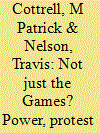

|
|
|
|
|
| Publication |
2011.
|
| Summary/Abstract |
This article conducts a theoretical and empirical analysis of political protest activity surrounding the modern Olympic Games. Although the Olympics are certainly among the world's most prominent and recognized events, they have seldom been explored from a political perspective within the mainstream International Relations and transnational protest literatures. We argue, however, that the Olympics provide a theoretically interesting context in which to examine political contention in International Relations in large part because they provide such a unique opportunity structure for a range of actors to exercise power in pursuit of their goals. The article presents an original dataset of all protest occurring between 1896 and 2008 and uses these data to show that not only has Olympic political contention grown substantially over time, but it also has evolved in interesting ways in terms of the particular actors engaged in contention, the tactics they use, and the resistance they face. Furthermore, we suggest that the study of the Olympics has important implications for understanding the power and power limitations of those actors (including transnational advocacy networks, international institutions, and sovereign states) participating in Olympic protest.
|
|
|
|
|
|
|
|
|
|
|
|
|
|
|
|
| 7 |
ID:
110784


|
|
|
|
|
| Publication |
2011.
|
| Summary/Abstract |
This article examines how the foundations of the 'rogue states' security narrative in the United States developed prior to the declaration of the George W. Bush administration's 'Global War on Terror' and President Bush's representation of Iraq, Iran and North Korea as an 'axis of evil'. The article argues that the puzzle of how US post-Cold War foreign and defence policy came to be focused on 'irrational' - but militarily inferior - adversaries can be understood through analysing how actors within the US defence community discursively constructed discrete international crises as the trigger for a major shift in US threat scenarios. This is developed through an examination of two crucial episodes in the construction of post-Cold War US national security interests: the crisis in the Persian Gulf in 1990-1 and the North Korean nuclear crisis in 1993-4. The article suggests the importance of historicizing contests over the interpretation of international crises in order to both better understand the process through which a country's national security interests are defined and to gain greater analytical purchase on how security narratives are reconstructed during processes of systemic change.
|
|
|
|
|
|
|
|
|
|
|
|
|
|
|
|
| 8 |
ID:
110783


|
|
|
|
|
| Publication |
2011.
|
| Summary/Abstract |
Dialectics remains an underutilized methodology in contemporary IR theory, which represents a significant limitation to the study of world politics, particularly in under-standing processes of transformation and change - an oversight that this article intends to redress. This article has two primary goals. First, it aims to reconstruct and build upon the small but robust debate concerning the validity of dialectics in IR that has been championed previously by Alker and Biersteker, and Heine and Teschke, respectively. Second, it contrasts dialectical and deterministic approaches to IR, as exemplified in Coxian Critical Theory and neo-realism, as a means to showcase the merits of the former as an approach to the study of social change in world politics. The ultimate aim of the article is to offer the groundwork of a social-relational dialectical approach to world politics that is focused on the intersubjective engagements between human beings, which can be developed in future research. Through such an analytic, the dialectical processes in social life are shown to be open-ended and the article rejects any understanding of 'inevitable' progress/regress or teleological end point. On the one hand, this account of dialectics promises greater analytical potential for understanding processes of change in world politics but, on the other, indicates the potential for the irrational toleration of contradiction and antagonism as an accepted feature of social life. Ultimately, the article argues that the skilled dialectician should emphasize human agency and intersubjectivity within a social-relational dialectical approach to world politics.
|
|
|
|
|
|
|
|
|
|
|
|
|
|
|
|
|
|
|
|
|